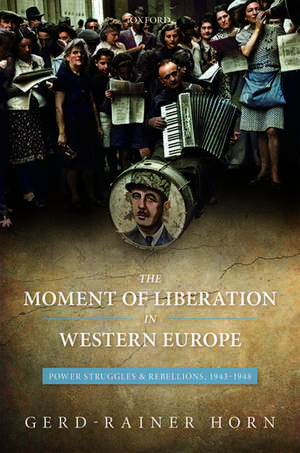The Moment of Liberation in Western Europe: Power Struggles and Rebellions, 1943-1948
Autor Gerd-Rainer Hornen Limba Engleză Hardback – 19 mar 2020
Preț: 558.39 lei
Preț vechi: 757.35 lei
-26% Nou
Puncte Express: 838
Preț estimativ în valută:
106.86€ • 111.15$ • 88.22£
106.86€ • 111.15$ • 88.22£
Carte disponibilă
Livrare economică 13-19 martie
Preluare comenzi: 021 569.72.76
Specificații
ISBN-13: 9780199587919
ISBN-10: 0199587914
Pagini: 282
Ilustrații: 20 black and white figures/illustrations
Dimensiuni: 161 x 231 x 22 mm
Greutate: 0.57 kg
Editura: OUP OXFORD
Colecția OUP Oxford
Locul publicării:Oxford, United Kingdom
ISBN-10: 0199587914
Pagini: 282
Ilustrații: 20 black and white figures/illustrations
Dimensiuni: 161 x 231 x 22 mm
Greutate: 0.57 kg
Editura: OUP OXFORD
Colecția OUP Oxford
Locul publicării:Oxford, United Kingdom
Recenzii
What is new and has not been dealt with in this breadth ever before is the investigation of grassroots networks which anti-fascist partisans and resistance fighters tried to establish in the transition from underground activism to the struggle for political power. Regardless of their ultimate failure, these experiences convey important historical lessons. These lessons are all the more important as Gerd-Rainer Horn treats his topic from a comparative perspective. He examines important developments in Germany, Italy and France with a sideways glance at Belgium.
...the book is highly original in more ways than one. It underscores the complexity of situations often approached too unilaterally from partial perspectives. This study raises the question of how to exit from a major societal crisis and how to negotiate the difficult articulation between the various interlocking struggles, shaped by the interplay of local forces against the background of a vast political spectrum on national and supra-national levels, a question that we will encounter mutatis mutandis in all subsequent major crises, the contemporary urgency of which will have escaped no one.
The book allows one to understand the political context of sometimes insurrectional struggles for power, shaping the modalities of post-war reconstruction. The author emphasizes the importance of grassroots networks of resistance fighters, far from the circles of political power and confronted with the difficulties of daily life, calling into question the pre-war elites in an attempt to substitute local powers to a Jacobin logic. The book ends with a rich and stimulating bibliographical essay covering the entire range of countries analyzed.
Horn has presented an impressive book in which he merges the many individual examples of liberation committees, freewheeling newspapers, and imaginative actions by various levels of official administrations and factory militants into a convincing overall picture. In doing so, he makes use of a lively, graphic, vivid language which captures the mood of this promising conjuncture - with a tendency to catchy formulations.
...the book is highly original in more ways than one. It underscores the complexity of situations often approached too unilaterally from partial perspectives. This study raises the question of how to exit from a major societal crisis and how to negotiate the difficult articulation between the various interlocking struggles, shaped by the interplay of local forces against the background of a vast political spectrum on national and supra-national levels, a question that we will encounter mutatis mutandis in all subsequent major crises, the contemporary urgency of which will have escaped no one.
The book allows one to understand the political context of sometimes insurrectional struggles for power, shaping the modalities of post-war reconstruction. The author emphasizes the importance of grassroots networks of resistance fighters, far from the circles of political power and confronted with the difficulties of daily life, calling into question the pre-war elites in an attempt to substitute local powers to a Jacobin logic. The book ends with a rich and stimulating bibliographical essay covering the entire range of countries analyzed.
Horn has presented an impressive book in which he merges the many individual examples of liberation committees, freewheeling newspapers, and imaginative actions by various levels of official administrations and factory militants into a convincing overall picture. In doing so, he makes use of a lively, graphic, vivid language which captures the mood of this promising conjuncture - with a tendency to catchy formulations.
Notă biografică
Gerd-Rainer Horn is Professor of History at Sciences Po, Paris, France, since 2013. He has previously taught at Western Oregon University, the University of Huddersfield, and the University of Warwick. His area of research expertise is the twentieth century history of transnational social movements in continental Western Europe.
